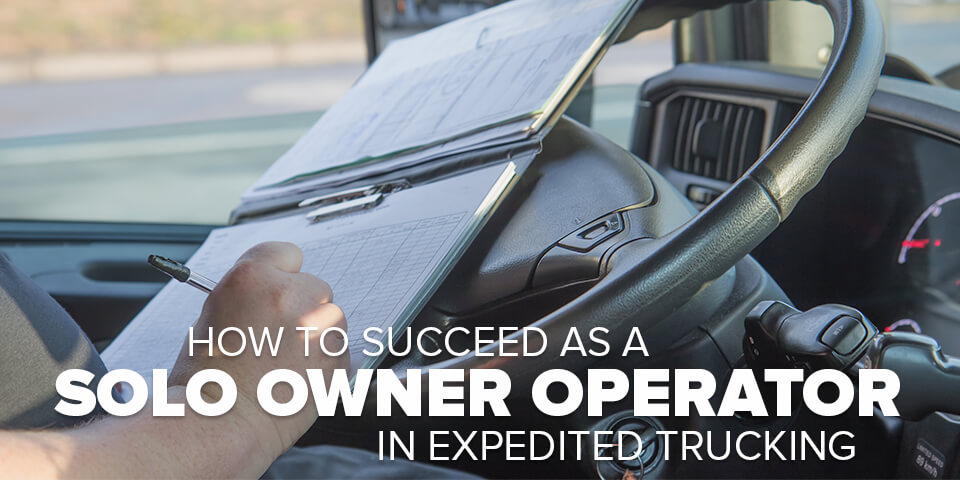In The News

How to Succeed as a Solo Owner-Operator in Expedited Trucking
The conventional wisdom in expedited trucking is that it’s hard to make a good living as a solo owner-operator—at least for those who operate a straight truck versus a lower-cost cargo van.
That’s because the economics of running a straight truck tend to make more sense for teams that can switch drivers to keep their trucks rolling (and making money), while staying within hours of service (HOS) regulations, whereas solos must stop to take required rest breaks, which can limit their miles, load options, and income potential.
But there are solos who have found ways to make money with a straight truck, such as Greg Huggins, a solo owner-operator leased to Landstar who runs a 2015 Freightliner Cascadia. Huggins became an expediter in 2014 after over two decades driving a straight truck in the furniture-moving business.
What led Huggins to get into expediting? What are some of the keys that have helped him build a successful solo operation? And what advice does he have to give to other expediters looking to go solo?
EO recently caught up with Huggins to get his story. Here is an edited version of our conversation.
EO: What led you to leave the furniture-moving business to get into expedited trucking?
Greg Huggins: Yeah, [expediting] is definitely a different type of business. But there are also a lot of similarities to what I was doing. And I was already familiar with trucking and knowing what it takes to operate a straight truck profitably. So, I would say the biggest reasons for making the switch to expediting were the economy at the time and the market conditions in the furniture business. After doing a lot of research on expediting, I realized it’s not much different than what I had already been doing and it might provide more opportunity. So, I made the change.
What are some of the key challenges you see running as solo
The biggest thing for me at first was that I didn't know what to expect entirely. You can research all you want, but when you hit the ground, you're going to find out things that you forgot to research. And a big challenge for solo versus team drivers is the hours of service. One team I know jokingly refers to your solo expediters as 'snail mail' compared to ‘email' for teams. But I don't agree with that analysis. I think I make pretty good time as a solo.
Why do you think that is? What would you say are the keys that have enabled you to "make pretty good time”—and money—running solo?
Don't take shortcuts. You've got to put the work in. I didn't find my own spot in expediting immediately, but I just kept working at it until I found what I really wanted to get out of this line of work. And now the business has become more and more consistent for me and not as erratic as it was when I started.
When you say, “Find your own spot in expediting,” what do you mean? What is the “spot” you have found?
I don’t mind the physical aspect of loading and unloading a truck, which I had done a lot of in the furniture-moving business. So, having a lift gate on my truck gives me that opportunity to do some of that physical part, which also enables me to be more one-on-one with the customer, versus just being a numbered truck at a dock. That's really where I want to be. I don't want to just be truck number whatever. I like a personal connection with the customer, where they say, "Oh, you're going to meet Dan, and you're going to unload to the 17th floor," that sort of thing.
From your perspective, how can solo operators really set themselves apart in the expedite business?
By solving customer’s problems. Sometimes things happen, and you have to find a way to make something work to everyone's benefit. If you're able to consistently find solutions to problems that you didn't know were coming, that will definitely set you apart. This way, when something is assigned to you, no one's concerned about whether you're going to complete the job. The customer has complete confidence that whatever needs to be done, you’ll make it happen. That will set you apart from the guy who always has an excuse for why he can't do something.
What is an example of that type of creative problem-solving?
I had a delivery to make in New Jersey. It was an inside dock where the clearance was too low to get my truck into. I could unload the freight with my lift gate. But I wouldn’t be able to load it onto the dock. Then I noticed a flatbed truck nearby unloading with a forklift. The obvious solution that came to mind would be for this guy to pick my stuff up and help me load it onto the dock. So, I approached him and got him to put my freight up on the dock, where I could go around and finish the delivery further up in the building. That’s a solution to a problem that you wouldn’t necessarily be able to plan for. If you weren't on the scene, you wouldn't know that such a solution would be available. You just have to get creative in the moment.
What is your bottom line advice to expediters looking to go solo?
I think if you're running solo, don't try to run like a team. As a solo, you're not going to be able to get the same miles in per day as a team, so don't buy more truck than you need. You don't want to start out further in the hole than you can dig yourself back out of. Instead, understand your costs and stay within your means—that’s very important.
